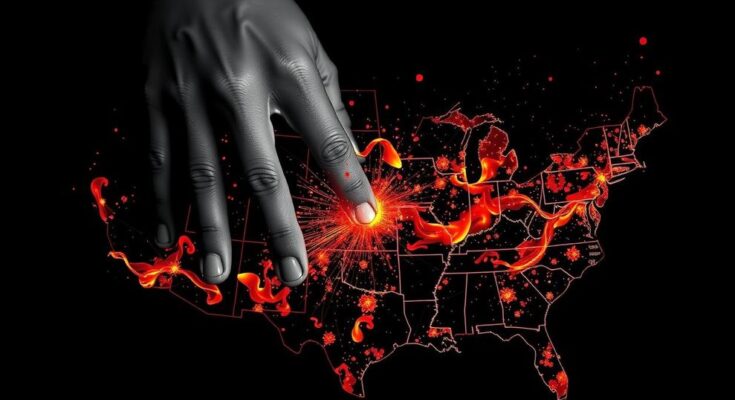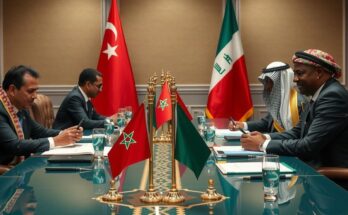U.S. intelligence officials warn that Russia and Iran may provoke violent protests following the upcoming election to incite division and undermine trust in the electoral process. A recent intelligence memo indicates these nations might encourage domestic unrest, particularly this year due to increased understanding of America’s electoral certification system. The memo references past attempts by Russia to recruit Americans for protest organization and Iranian support for demonstrations against U.S. policies. Fears of disinformation and political violence have escalated during this election cycle.
Senior intelligence officials in the United States have expressed concerns that Russia and Iran may instigate violent protests following the upcoming election. In a memo released by the Office of the Director of National Intelligence, officials indicated that these nations might either covertly orchestrate protests or incite participation in events organized by domestic groups. The primary objectives of these actions would be to exacerbate division within the United States, undermine confidence in the election results, and complicate the transition of presidential power. The memorandum highlighted a January incident in which Russian military intelligence made attempts to recruit an American citizen to lead protests, claiming that this individual was likely unaware of their affiliation with Russian operatives. Furthermore, the Iranian government has been accused of supporting protests against U.S. policies regarding Israel and offered logistical assistance to demonstrators in Washington. The heightened risk of foreign powers promoting political violence post-election can be attributed to their understanding of the U.S. electoral certification process, demonstrated following the January 6, 2021, Capitol attack. As such, foreign adversaries may seek to exploit genuine irregularities or misinformation to disrupt this process. The safety concerns have prompted some election officials to reinforce security measures at polling places. The proliferation of online disinformation and propaganda has led to increased fears regarding political violence, as adversaries aim to deepen societal polarization. Russia is posited to favor candidates like former President Donald Trump, who has previously expressed admiration for Russian leadership, while Iran may pursue attacks on Trump’s campaign due to past U.S. sanctions. It is expected that Russia will strive to provoke protests in the U.S. regardless of electoral outcomes, although their response may be more intense should Vice President Kamala Harris prevail over Trump. Intelligence assessments indicate that while China engages in election-related disinformation, it does not appear poised to instigate violent protests. Concerns remain about the potential for foreign interference to discourage voting among certain demographics, as exemplified by incidents in the previous election cycle. In response to these threats, voting rights organizations are implementing public campaigns aimed at bolstering public resilience against disinformation. As political tensions grow, it is paramount that constituents recognize their authority in determining electoral outcomes, not as influenced by extremist factions or disinformation agents. Although Russia, Iran, and China have dismissed allegations of electoral meddling, the persistence of such threats remains a significant challenge to the integrity of American democracy.
This article discusses the warnings issued by U.S. intelligence officials regarding potential foreign influence in the aftermath of the upcoming presidential election. Specifically, Russia and Iran are highlighted as nations that may attempt to incite violence and manipulate public perception, with the goal of destabilizing U.S. democracy. The intelligence memo underscores the sophisticated understanding these adversaries have regarding the electoral process, which could lead to attempts to exploit vulnerabilities between the election and the inauguration. The context includes previous incidents of foreign interference and the impact of disinformation campaigns that have been observed in recent political contexts.
In conclusion, the potential for foreign adversaries, particularly Russia and Iran, to incite post-election violence presents a significant risk to the integrity of democratic processes in the United States. With historical precedents in mind, intelligence officials underscore the urgency of remaining vigilant against disinformation and foreign interventions aimed at exacerbating political divisions. It is imperative for citizens to recognize their role in the electoral process and remain resilient against attempts to undermine democratic practices, as highlighted by voting advocacy groups and civil rights organizations.
Original Source: apnews.com




